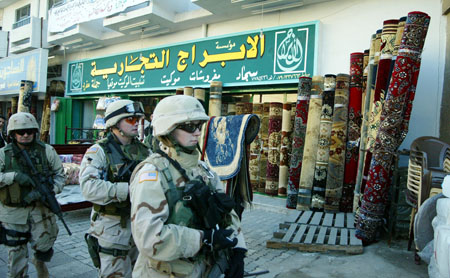“Baghdad was convulsed by a deadly wave of explosions as terrorists detonated up to nine explosions in the course of a few hours on Tuesday morning on the 10th anniversary of the US-led invasion,” reports Peter Beaumont for the Guardian.
Writing for the New Yorker, George Packer argues that “the war was a disaster for Iraq and the U.S. alike. It was conceived in deceit and born in hubris, a historic folly that took the American eye off Al Qaeda and the Taliban, while shattering Iraq into a million bloody pieces. When the last American troops departed a little over a year ago, there was no sense on this side of triumph or satisfaction—nothing but sadness and relief. Iraq, meanwhile, remains a dramatically violent country. Its politics are oriented toward Iran and the broader Shiite side of a looming regional war. After two trillion dollars, thousands of American lives, and over a hundred thousand Iraqi lives, there is so little U.S. influence that we can’t get the government of Iraq to interdict Iranian weapons shipped across its territory to arm the soldiers of Bashar al-Assad in Syria. Iraq has rejected the organ transplant and gone its own way. I imagine that there are far fewer American traces left in Baghdad than there were in Saigon after 1975.”
“A messy, troubling conflict that lasted for years longer than expected, the Iraq war has been a difficult subject for filmmakers and television producers,” writes Tara McKelvey in a report for BBC News. “In the Academy-Award-winning film about World War II veterans, Best Years of Our Lives, the main characters were ‘profoundly affected by the events of the war,’ says Kent Jones, the New York Film Festival’s director of programming, but ‘were expected to get back in the swing of things.’ After the Vietnam War, he says, films such as Coming Home and The Deer Hunter portrayed veterans as individuals who ‘felt they had been sold out by their country. With the Iraq war, it’s more of a kind of floating sensibility. We don’t really know where we are. The circumstances that got us into the war were kind of dubious, and then the war stretched on and on,’ says Jones.” McKelvey’s piece covers diverse takes on Kathryn Bigelow’s Oscar-winning The Hurt Locker (2009), Irwin Winkler’s Home of the Brave (2006), Paul Haggis’s In the Valley of Elah (2007), Kimberly Peirce’s Stop-Loss (2008), and Oren Moverman’s The Messenger (2009), among others. Comments Scott Foundas: “We haven’t see a film on Iraq that is comparable to what Apocalypse Now was for Vietnam—when you’re moving right into some allegorical realm and showing what this thing meant for us. It may be some time, if ever, before we see that kind of movie about Iraq.”
What’s come out of that war instead, in part because of the major leap forward in portability and quality of digital filmmaking technology in the early 2000s, are documentaries—Wikipedia lists over 60. Among the best of these would be James Longley‘s Iraq in Fragments (2006), nominated for an Oscar and winner of a slew of other awards. “From 300 hours of material,” wrote the New York Times‘ A.O. Scott, “Mr. Longley has created a collage of images, sounds and characters, an intimate, partial portrait of an unraveling nation—a portrait that gains power partly by virtue of its incompleteness.” Earlier that year, Michael Atkinson, writing in the Voice, called Laura Poitras‘s “unassailable and whip-smart doc” My Country, My Country “the definitive nonfiction film about the occupation, and as a counterpoint against acres of corporate-spun non-news, it is indispensable.” In the now defunct New York Sun, Nicolas Rapold called Andrew Berends‘s The Blood of My Brother “a wrenching account of individual tragedy in a politically and physically treacherous world…. Movies about Iraq are often criticized for not giving the big picture. The words of one victim briefly visited here may explain the compromise by expressing the consuming sadness and solitude of personal loss: ‘There is nothing like our catastrophe.'”
Further reading, viewing, and listening: “Iraq: 10 Years, 100 Viewpoints” at arte, Foreign Policy‘s “Iraq War Diaries,” and special sections at Bookforum, CNN, the Guardian (which includes a startling infographic), the New Republic, and NPR.
For news and tips throughout the day every day, follow @KeyframeDaily on Twitter and/or the RSS feed. Get Keyframe Daily in your inbox by signing in at fandor.com/daily.





